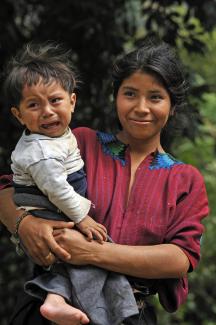Health
The right to one’s body

In 2011, Guatemala’s national youth survey (Encuesta Nacional de la Juventud) revealed that half of all young people do not use contraceptives when they have sex. That was true both of current as well as previous relationships. Two out of ten juveniles, moreover, did not know how HIV/AIDS is transmitted.
Another report, which was published by the youth network Red de Jóvenes para la Incidencia Política and the health-care organisation Médicos del Mundo that year, showed that most high school students were not learning enough about contraceptives. Making matters worse, even those who were appropriately informed either did not feel the need to use contraceptives or could not afford to buy any. Many teenage girls, moreover, stated that their partners did not allow them to use contraceptives.
Girls are also at risk of being sexually abused by family members. According to the UN Population Fund, 26 % of the girls of the age 10 to 19 are mothers because of sexual abuse and disregard for contraceptives. Teenage motherhood limits their personal growth and thwarts their professional ambitions. Typically, they are expelled from schools and colleges.
Sexuality is only considered to be something bodily in Guatemala, says Ana Lucía Ramazzini, a sociologist and women’s rights activist. She has taught sex-education classes in schools and non-governmental institutions for 20 years. She reports that schools normally focus only on biological dimensions. Students learn the names and reproductive functions of organs, but relationships and power differentials between men and women are not discussed at all. “The power dimension means that the female body is seen as an object of male lust and is basically meant to satisfy other people’s desires,” Ramazzini says.
According to Ramazzini, how a women experiences sex is defined by her cultural identity, age and socio-economic standing. These issues also mark how well she knows her rights. Ramazzini insists: “Feminism takes into account emotional, social and political aspects, and so must holistic sex education”. Important issues in this context include:
- demystifying notions of idealised motherhood, so girls are not made to believe their one and only goal in life is to have children,
- identifying discrimination against women as well as gender-based violence and considering them criminal behaviour, and
- assessing how the media and public institutions reproduce stereotypes and thus boost their relevance.
Women must be put in control of their own bodies, demands Ramazzini. In her eyes, education must point out relevant things early on, so women can benefit from such knowledge for their whole life. She says: “Personal empowerment crucially depends on asking oneself: ‘what do I want?’”.
Ten non-governmental organisations have joined forces to launch a campaign for better sex education in Guatemala. This Campaña Nacional por la Educación Sexual demands that the government provide adequate funding.
Guatemala’s ministries for health and education are similarly aware of the matter. Last year, they drafted a strategy for holistic sex education and the prevention of violence (“Estrategia de Educación Integral en Sexualidad y Prevención de la Violencia). In a pilot phase, measures to improve sex education and reproductive-health services will be implemented in a number of municipalities. (pg)
Patricia Galicia is a radio journalist based in Guatemala City. paticalicia@yahoo.com













